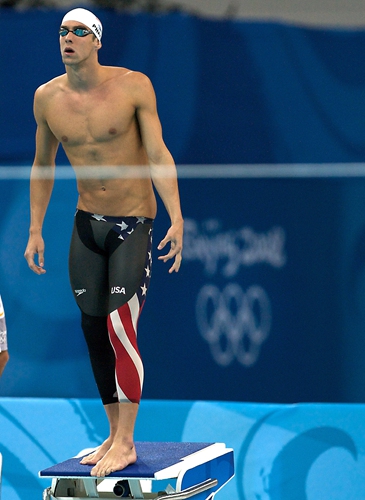Mentality matters
By Lu Wenao and Li Shuo Source: Global Times Published: 2020/7/19 17:43:41 Last Updated: 2020/7/19 10:43:41
Mental issues under spotlight amid pandemic

Michael Phelps Photo: VCG
With the world still battling the novel coronavirus pandemic, the mental health of athletes has also been put under the spotlight since the virus has postponed sports activities nearly everywhere in the world.
The sports world's marquee event, the Tokyo Olympic Games, originally scheduled to start on Friday, has been postponed to 2021, meaning athletes have to prepare one more year for the quadrennial event.
The postponement of the Olympic Games has forced some veteran athletes to retire before their chance to compete due to age and deteriorating physical condition, including China's badminton great Lin Dan. However, the virus delay could also deal a big blow on conditions that are often ignored.
Huang Junhong, a psychologist for China's national weightlifting team, said the virus delay has disrupted the Chinese athletes' preparation schedule for the Olympics.
"Some of them were already close to reaching their peak form in March when we learned that the Olympics will be postponed," Huang told the Global Times.
"The delay has disrupted their training schedule, bringing about a huge amount of uncertainty for the athletes."
Unlike the immediate pressure athletes often have to deal with ahead of high-profile competitions, this extended wait may be a metal challenge not everyone is prepared to face.
"Some people might take to excessive drinking to dodge these issues rather than solving them," Huang said. "Meditation is a good way to handle mental issues but not everyone knows how to do it properly."
Huang suggests that athletes set goals for different phases on the way to the delayed Olympic Games or any other major sports competitions, which will help them become less distracted.
Sports leagues in China
China's basketball league, the CBA, returned to competition in June, but the athletes and coaches have to finish the season in quarantine zones in two cities rather than traditionally playing home and away matches.
That means the basketballers' choices on life are limited, as their workplace are limited at hotels, training c nters and competition venues.
The CBA later allowed the athletes to go local sightseeing by applying to the organizers in the host cities of Dongguan in South China's Guangdong Province and Qingdao in East China's Shandong Province - both are the tourist magnets of their respective regions.
Psychologist Huang Jing, who entered the public consciousness with a widely circulated pep talk to the Chinese national women's basketball team players during an Olympic Games qualifier in February, is also holding lectures with every CBA team during the quarantine period to help them cope with mental issues.
The quarantine has had its victims in the CBA.
Wang Dawei, the CEO of the CBA, resigned for "personal reasons" on Sunday. Though the organizers did not unveil the specific reason behind his departure, speculation has run rampant that he left due to matters related to the quarantine.
In football, the Chinese Super League (CSL) also plans to return on Saturday after a five-month delay.
The 16-team league will see its games played in Dalian, Northeast China's Liaoning Province and Suzhou, East China's Jiangsu Province. The two cities are also major tourist destinations.
Chinese football's governing body, the Chinese Football Association (CFA), said it is working with local organizers to provide leisure venues such as karaoke rooms and libraries and activities including playing video games, snooker, badminton or going swimming.
Yan Junling, goalkeeper of CSL giants Shanghai SIPG, also admitted that the footballers might need psychiatric consultations in the second month as they will be restricted to one city for two months to play the games.
High-profile cases
Sports are often considered a way to help blow off mental stress, but it is can also be a source of pressure for professional athletes. Unfortunately, the mental challenges facing athletes are often only paid any attention after extreme events such as suicides take place.
Former German national football team keeper Robert Enke committed suicide in November 2009 by standing at a level crossing in front of a regional express train. His widow later revealed that her husband had been suffering from depression for six years.
Former Shandong Luneng forward Miljan Mrdakovic from Serbia also committed suicide in May, which shocked Chinese fans.
The mental health of athletes will be explored in a documentary scheduled to debut later in July.
Online streaming site HBO will release The Weight of Gold, about the mental health challenges on Olympians on July 29. It will be narrated by the world's most decorated swimmer Michael Phelps.
Phelps became a mental-health advocate after his 2016 retirement. He said he experienced a state of depression after each of his five Olympic Games.
"For a long time, I only saw myself as a swimmer, not a person," Phelps said in a statement.
"It is my hope that we can encourage others to open up, let them know they are not alone and that it's OK to not be OK. For me, the opportunity to help break the stigma surrounding mental health and potentially save a life is way more meaningful than any Olympic medal."
The documentary will also feature snowboarding ace Shaun White, a three-time Olympic gold medalist, and figure skater Gracie Gold, who won bronze at 2014 Sochi Olympics but skipped the 2018 Games due to mental issues.
Posted in: MISCELLANY